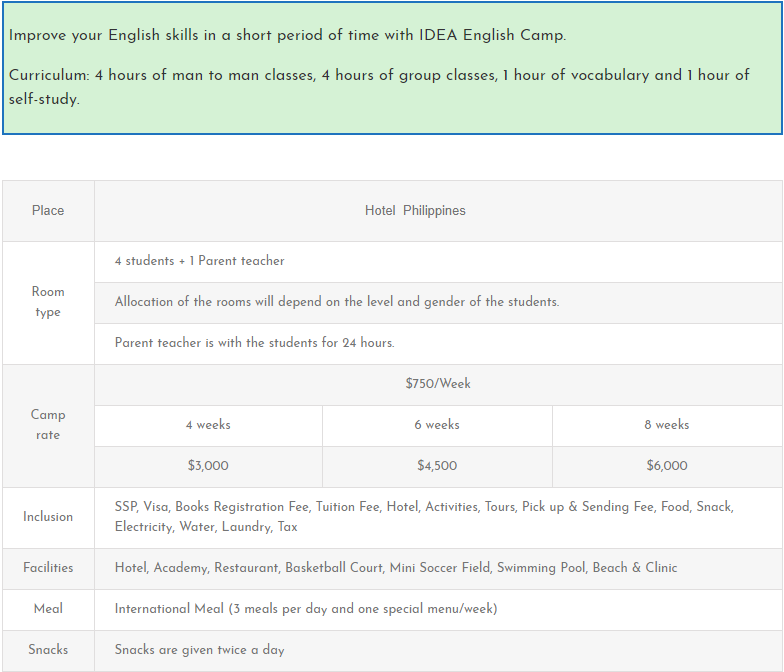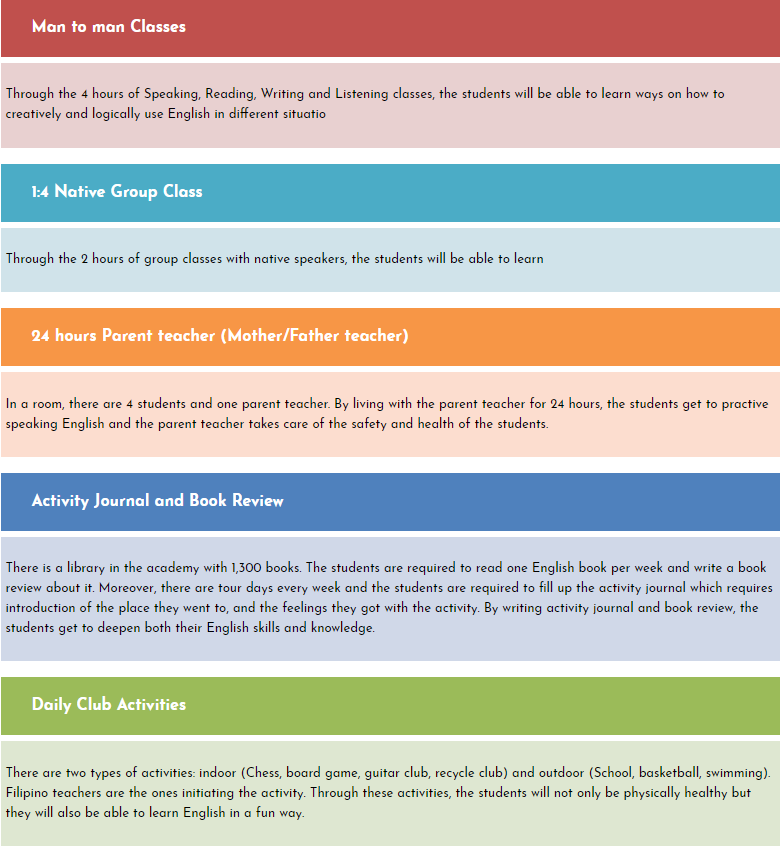


camp experience
IDEA INC.

Year
2018
2017
2016
2015
2014
2013
2012
2011
2010
2009
2008
Camps
Canyon Woods
Avalon Phil’s Camp (Summer, Winter Camp)
Canyon Woods / Aquamira Hotel and Resort / Tanza Oasis Hotel and Resort
Geumsan Camp(Summer, Winter Camp)
Dream Camp (Winter Camp)
Tanza Oasis Hotel and Resort
Geumsan Camp (Summer, Winter Camp)
Tanza Oasis Hotel and Resort
Avalon Phil’s Camp (Summer, Winter Camp)
Tanza Oasis Hotel and Resort
Avalon Phil’s Camp (Summer, Winter Camp)
Tanza Oasis Hotel and Resort
Avalon Phil’s Camp (Summer, Winter Camp)
Tanza Oasis Hotel and Resort/ Sol y Viento
Dream Camp (Winter Camp)
Tanza Oasis Hotel and Resort/ Imiramona
Kyowon-Oasis Hotel Tanza (Summer Camp)
Deli-English-Oasis Hotel Tanza (Summer Camp)
Camp Korea-Oasis Hotel Tanza (Winter Camp)
Dream Camp-Oasis Hotel Tanza (Winter Camp)
Deli-English-Imiramona Laguna (Winter Camp)
Kyowon-Imiramona Laguna (Winter Camp)
Caylabne Bay / Montreal Garden Resort
Avalon-Caylabne Bay (Summer Camp)
Kyowon-Pila, Laguna (Summer Camp)
Deli-English-Pila, Laguna (Summer Camp)
Avalon-Caylabne Bay (Winter Camp)
Kyowon-Pila, Laguna (Summer Camp)
Deli-English-Pila, Laguna (Summer Camp)
Montreal Garden Resort
Pila, Laguna (Winter Camp)
Montreal Garden Resort
Pila, Laguna (Winter Camp)
Learn English and dream big with the Camp that provides the best environment and curriculum for every students.
Level System
Have little or no ability to understand spoken and written English used in academic and social setting.
Ability:
– Use very simple sentences usually composed of four to five words.
-Can handle a very routine work situation that do not require much oral communication in English.
Listening:
-Respond to simple requests for repetition.
-Respond appropriately to short warnings and commands.
-Demonstrate understanding of simple face to face conversation.
-Demonstrate understanding of simple words especially which can be used in everyday situations.
Speaking:
-Make simple statement about everyday activities.
-Answer simple questions with short-phrase responses.
-Engage in simple conversation on limited and familiar phrases.
-Give simple commands and express caution using short phrases.
Reading:
-Recognize personal information words in print.
-Follow one to three step written instruction.
-Read and understand simple sentences using vocabulary previously learned.
-Use familiar visual clues such as pictures, graphs and charts to predict meaning
Writing
-print letters of the alphabet legibly.
-copy familiar words, phrases from learned materials
-write series of simple sentences on one topic
-fill out forms that require limited personal information
Have limited ability to read and write in English.Can read familiar phrases and simple sentences but has limited understanding of connected prose and may need frequent re-reading.
Ability:
-can do routine work situation that involve the most basic oral communication skills on a nontechnical level and in which all tasks can be demonstrated
Listening:
-respond appropriately to simple instructions and other non-classroom request or clarification
-differentiate statements from questions based on grammatical structure and intonation patterns
-identify the main topic of conversation in familiar material
-recognize words that signal differences between present, past and future events
Speaking:
-ask and answer simple questions related to basic needs
-engage in conversational exchanges on familiar topics
-give and ask for simple directions and instructions
-ask for and give meaning of familiar words and expressions
Reading:
-use visual clues to predict meaning and interpret new words
-read and demonstrate understanding of short, simplified narrative paragraphs on familiar topics
-identify the sequence of events in writing directions
-identify the main idea in a brief reading passage
Writing:
-write simple sentences and loosely organized paragraphs based on personal experiences or familiar materials
-fill out simple forms that require some detailed personal information
-write down key information from a recorded message
-edit, revise writing for capitalization, sentence punctuation and correct spelling
Function satisfactorily in the use of English in basic survival situation related to their needs.
Ability:
-can handle situation that involve limited oral communication skills on a nontechnical tasks that can be clarified orally or demonstrated repeatedly when communication breaks down
Listening:
-differentiatee formal from informal languages, including reduced speech.
-demonstrate understanding of the general meaning of unfamiliar vocabulary and details based on context
-identify essential information from listening passage when given a verbal prompt
Speaking:
-describe a sequence on a topic related to personal lives
-prepare and deliver a short, simple oral presentation on a familiar topic
-initiate and maintain simple conversation using appropriate formal and informal addresses
-give and ask for directions and give increasingly complex commands and warnings
Reading:
-interpret abbreviation for increasingly variety of words in context of specific topics
-interpret simple, short narrative and descriptive passages using visual, graphic and textual clues
-skim for general meaning in short passages or paragraph
-identify the main idea of a paragraph on familiar topic
Writing:
-write short note or message including some supporting details
-take notes on familiar material transmitted orally
-write a paragraph that includes a topic sentence, supporting details and a conclusion
-edit writing for spelling, capitalization, punctuation and basic grammatical form with some degree of accuracy
Have the ability to speak in a simple manner using English commonly heard in routine academic and social settings.
Ability:
-presents information with some organisation. Produces basic sentence forms with accuracy uses a limited range of more complex structures.
Listening:
-demonstrate understanding of everyday conversation when speakers make some adaptations
-listen and record details
-identify main ideas and most supporting details in a listening exercise related to everyday topics
-detect the general mood of a message, determining to a limited degree such components as the attitude and feelings.
Speaking
– Engage in longer conversation whether be it familiar or unfamiliar topics.
– Ask and give clarification of previous utterances.
– Participate in face to face conversation on some topics beyond immediate survival needs such as personal histories and descriptions of people and places.
Reading
– Identify chronological order and simple transition in texts on familiar subjects.
– Able to draw conclusion on familiar topics.
– Determine connections between ideas within a passage by interpreting transitional words.
– Understand implied meaning in simple sentences.
Writing
– Take notes on both familiar and unfamiliar information which were transmitted orally.
– Produce short essays using simple transition words.
– Fill out increasingly complex papers, forms, questionnaires and surveys.
– Write a short e-mail or business letters.
Learners have enough ability in the use of English to function independently in most familiar situations.
Listening
– Identify key information/detail in a description.
– Respond to request for clarification and elaboration.
– Distinguish between facts and opinions in a conversation.
– Immediately detect mood changes and make predictions about what the speaker will say next.
Speaking
– Ask and make questions using complex sentences.
– Express opinions, arguments/disagreement, satisfaction/dissatisfaction.
– Provide detailed instruction.
– Produce statements, questions and commands in less familiar context with some details.
Reading
– Able to scan passages or forms to identify particular details.
– Identify facts and opinions in a text.
– Skim for main idea and scan for details in prose texts and documents.
– Interpret information in a text in order to answer questions.
Writing
– Able to find information and draw conclusion by reading different passages.
– Can write detailed message and information.
– Draft, organize, write and edit short paragraphs using the main idea and supporting details.
Learners have the ability to use English to meet most routine social and work-related demands with confidence, though not without instances of hesitations and circumlocutions.
Listening
– Respond to face to face conversation spoken at normal speed that include slang languages.
– Has adapt listening strategies that include both unfamiliar and familiar conversation.
– Identify accurate and applicable information from a complex passage.
Speaking
– Prepare and deliver a well-organized oral presentation on a general topic.
– Knows how to be flexible when talking in a different types of situations.
– Engage in complex conversation whether be it familiar or unfamiliar topic.
– Speak fluently in informal conversation on practical and social topics.
Reading
– Apply appropriate reading strategies for understanding unfamiliar content.
– Make judgment on the information that can be seen in the reading material.
– Interpret main ideas and key points from specialized materials.
– Evaluate information for accuracy and relevant purposes.
Writing
– Expand and combine simple sentences by adding modifying words, clause and phrases.
– Able to write detailed letters or messages with some degree of accuracy.
– Able to write summaries and paraphrase sentences of the reading materials.
– Write one to two descriptive and expository paragraph composition using correct punctuation and coherent organization.
Learners have the ability to use English to function effectively in familiar and unfamiliar social and work related situations with confidence.
Listening
– Understand conversation, lectures, discussion and speeches related to the field of interest.
– Determine the usefulness, bias, accuracy of the information presented orally.
– Listen selectively for words, phrases, or idea unite and other clues to infer meaning of the unknown words.
– Use context and work analysis skills to understand vocabulary and use multiple strategies to understand unfamiliar words.
Speaking
– Speak with fluency on specialized subject of interest.
– Engage in debate on organized or familiar topics.
– Prepare and deliver well-organized oral presentation on a specialized topic.
– Participate in casual, formal and extended conversation on practical and academic topics.
Reading
– Analyze author’s point of view.
– Determine meaning of increasingly complex passages by using contextual clues.
– Use background knowledge and linguistic contextual clues to understand the meaning of the unknown word.
– Accurately present, highlight and illustrate key points.
Writing
– Take note from full length formal presentation.
– Edit own and peer’s writing in terms of grammar, word choice, spelling, mechanics and sentence variety and organization.
– Use less common and idiomatic expression with occasional errors.
– Write composition with clear introduction, supporting details and conclusion.
Learners have the ability to use English to meet social, academic and vocational demands with confidence and success.
Listening
– Respond to topics beyond immediate survival needs such as news and events in the workplace and community.
– Reorganize and respond to idiomatic expression in a conversation.
– Recognize conversation openers/closures and polite expressions as used by the native speakers.
– Obtain detailed information in variety of context from conversation or broadcast.
Speaking
– Use a full range of pronunciation features with precision.
– Produce consistent accurate sentence structures.
– Know how to negotiate and compromise. Use persuasion in conversations.
– Clarify utterances by rewording or repeating in order to be understood by the general public.
Reading
– Distinguish, interpret and summarize descriptions and narrative topics.
– Knows how to use different reading strategies in order to understand different passages.
– Understand a variety of sentence patterns, new vocabulary and high frequency idioms.
– Take notes while reading and able to form opinions and conclusions.
Writing
– Write complex essays on a range of topics.
– Naturally and accurately use full range structures.
– Establish mood by choosing words that are appropriate for the situation.
– Able to distinguish literal from figurative languages.
Sample Monthly Schedule


